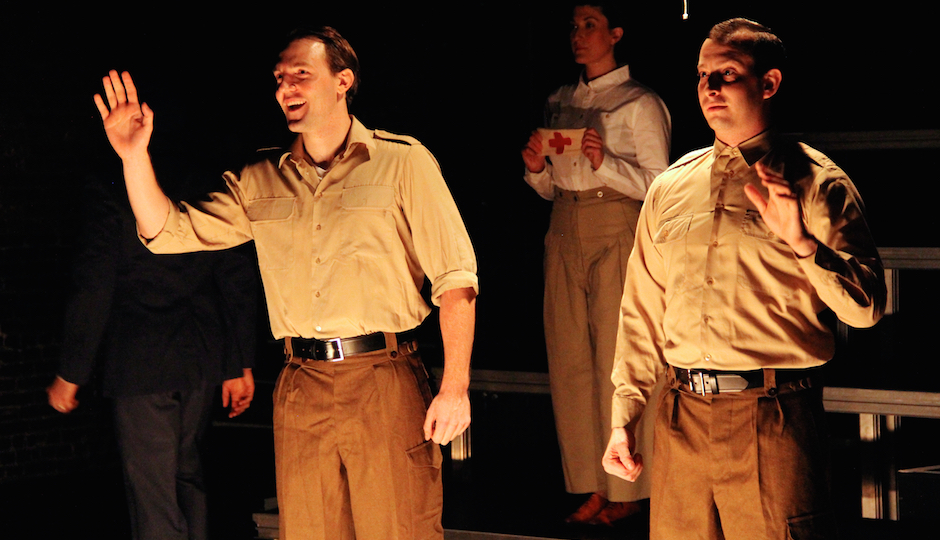Review: Pig Iron Theatre Restages Gentlemen Volunteers, and It’s Fantastic

Bryant Martin and Scott Sheppard in Pig Iron Theatre’s “Gentlemen Volunteers.” | Photo by Lindsay Browning Photography
Who says you can’t go home again?
Pig Iron Theatre is now 20 years old. In that time, the locally based company has moved from home-team status (they established a cult in Philadelphia almost instantly) to national and international prominence. They’ve done many shows, experimenting with a variety of styles, forms and configurations. Some of their work involves adaptation; other pieces are entirely original. They’ve worked with conventional theater configurations – a seated audience watching the action on stage – while at other times, that relationship is up-ended. (Gentlemen Volunteers is performed in promenade – the audience physically moves with the action.)
It’s axiomatic that Pig Iron thrives on invention (they describe the company as “dedicated to the creation of new and exuberant performance works that defy easy categorization”). Yet the group has returned a number of times to Gentlemen Volunteers. As well they should – this early piece was, for many of us, our introduction to the joys of Pig Iron. More important, it’s a brilliant tour-de-force that demonstrates the troupe’s virtues and stylistic authority were present from the very beginning.
Gentlemen Volunteers is a World War I story – an original work, though in setting and spirit, it seems to pay homage to Hemingway’s A Farewell to Arms. Two American college boys, Rich Conwell (played by Bryant Martin) and Vincent Barrington (Scott Sheppard) join the war effort. Once on the front, they meet a pair of nurses – a somewhat forbidding French woman, Françoise de La Tour (Melissa Krodman), and a bubbly young Brit, Mary Pinknell (Lauren Ashley Carter).
Gentlemen Volunteers follows the ups and downs of these four brave people – but that doesn’t begin to cover it. What’s most remarkable here is the way the production conjures specific locations and moments as if by magic. With the slenderest means – minimal scenery, virtually no props, dazzling lighting, accomplished through only a few instruments – we feel absolutely immersed in the action. There are moments of gasp-out-loud beauty that are produced not through lavish effects, but by almost invisible means.
Gentlemen Volunteers is a hallmark of Pig Iron’s sense of art. Through a kind of mimed language, they make it very clear that the audience shares some responsibility – it is partially up to us to imagine some of the connective fabric. The ultimate effect is that we experience WWI not as a cohesive narrative, but through a series of memorable vignettes. It’s a bit like the sensation of looking at a photograph album from long ago, and “filling in the blanks” through interpretation and invention.
I’ve seen many Pig Iron shows since I first encountered Gentlemen Volunteers. Some of them have dazzled me – but I think I love this one most of all, in large part because it has such heart and open, cynicism-free emotionality.

Michael Castillejos as the one-man band in “Gentlemen Volunteers.” | Photo by Lindsay Browning Photography
And perhaps the best news of all: Gentlemen Volunteers has never seemed better than it does here and now. That’s not a given – devised performance works like this one often are retired after the first production, especially when (as in this case) that original cast were deeply involved in the work’s creation. I thought that might be especially true in Gentlemen Volunteers. For example, there’s a fifth character – a “one man band” – which was formed around the special talents of James Sugg. Who else could possibly do it?, I wondered.
Well, it’s done brilliantly here by Michael Castillejos – he’s a very different type than Sugg, but marvelous in his own way. The same can be said of the other four actors. Pig Iron and this company have done what every great revival should – honor the tradition, while making the show their own.
A word of advice – when you see Gentlemen Volunteers (and see it you must, especially if this is your first time), dress comfortably – as you follow the action, you’ll be walking, standing, and occasionally sitting.
Also, by the end, almost certainly cheering.
Gentlemen Volunteers plays Christ Church Neighborhood House through December 27th. Go here for tickets and more information.
David Fox teaches theater and runs academic programs at the University of Pennsylvania. For 16 years, he was theatre critic for the Philadelphia City Paper; he has also written for The New York Times and other publications. He also blogs on arts topics at recliningstandards.org.
Read more of our reviews of shows playing now in Philly:
- Laurel Tree Theatre’s Hedda Gabler at Physick House (closes December 20th)
- Orbiter 3’s A Knee That Can Bend (closes December 20th)
- Baskerville: A Sherlock Holmes Mystery at PTC
- The Book of Mormon at Forrest Theatre
- Becoming Dr. Ruth at Walnut Street Theatre
- A Christmas Story at Walnut Street Theatre
Keep up to date with our local arts and events coverage. Here’s how:


